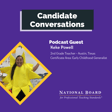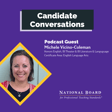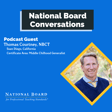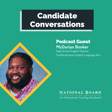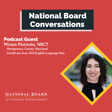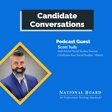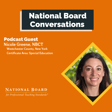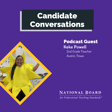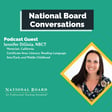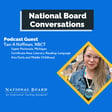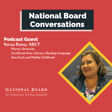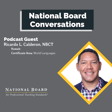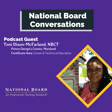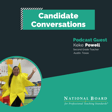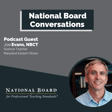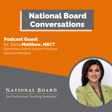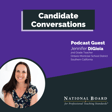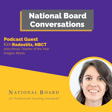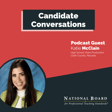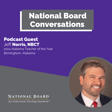Become a Creator today!Start creating today - Share your story with the world!
Start for free
00:00:00
00:00:01

Ray Salazar
On this episode of National Board Conversations, we take a trip to Chicago to speak with Ray Salazar. He is a National Board Certified High School English teacher, powerlifter, and more! You can check out some of his work at the White Rhino Blog and learn about his community efforts. We get to know how Ray became an English teacher, his state records in powerlifting, and talk about things close to him. Give him a follow on Twitter or Instagram, and I hope you enjoy the episode.
Twitter: @NBPTS
Instagram: @NBPTS
Facebook: The National Board for Professional Teaching Standards
Transcript
Introduction to Ray Salazar
00:00:00
Speaker
What's up, everybody? Welcome back to National Award Conversations. On this episode, I speak with Ray Salazar. He's a National Board Certified Teacher in Chicago, Illinois. We get into the work Ray is doing with teachers of color through the National Board process, and we get to know him more in the personal level, including learning that he's an Illinois State Record holder. Powerlifter? Crazy story. I won't hold you much longer. Here's my conversation with Ray.
Connecting Chicago with National Board Events
00:00:21
Speaker
Welcome to the show, Ray. How you doing today? What's up, buddy? Happy to be here. Oh, man, good to have you. I feel like this has been a check-in long, a little long and waiting, man. Yeah, we've had to, uh, we've got to connect Chicago and, uh, National Board a lot more, so this is a great opportunity. Yeah, I'm hoping they can get me out there, so. Or me out there. Right, that would be great. Get you to come to D.C. I'll show you around.
00:00:42
Speaker
All right, so we got
Ray's Career and Advocacy
00:00:44
Speaker
to get started. So can you tell us what your current role is and give a brief intro of yourself? So for over 25 years, I've been an educator in the Chicago Public Schools. I've been an English teacher as neighborhood alternative selective enrollment high schools. And aside from teaching and coaching the debate team and overseeing the school newspaper, I also write a blog about education and Latino issues on ChicagoNow.com. And that's called The White Rhino.
00:01:12
Speaker
And we'll be sure to link to that in the show notes. So that way you guys can check it out for us. So why did you end up becoming a teacher? And what pushed you to become an English teacher? You know, the story I tell is that I became a teacher because I didn't become a lawyer. I wanted to be a lawyer. You know, when I was a teenager, I wanted to be a lawyer. I was 15 years old and I wanted to be a lawyer.
00:01:34
Speaker
And I wanted to go to Princeton. Princeton, man, that's over in my, that's over near me. You know, that was my dream. And a lot of that came from the TV shows, you know, the kids on the Cosby Show and, you know, all of the sitcoms that I used to watch in the 80s, all of the kids went to big universities like that. They went away to college and, you know, they went out that path and I wanted that path too. And so I got into college
00:02:02
Speaker
And I had to declare a major and I kind of freaked out a little bit. I didn't have any mentorship. So I didn't have anybody that I could go to to guide me on the path toward a law degree. And so, you know, my parents are first immigrants from Mexico and they have always valued education and big supporters of education in our lives. But they didn't know the path, they couldn't guide me on the path toward a law degree.
00:02:30
Speaker
So when we kind of freak out and we don't know what to do, we revert to what we know, right? So I reverted to school and I liked school and I always did well in school and I felt like I belonged. So I said, well, I'm gonna become a teacher. And I picked English because I was a pretty good reader. I've always been a good reader. I liked writing and I didn't have a lot of good math experiences. So I wasn't gonna do that. I didn't really see a lot of connection with history, even though I love documentaries
00:02:57
Speaker
I love learning about history, but just my educational history, wasn't that great?
Teaching Satire and Real-World Issues
00:03:01
Speaker
So I, you know, I became an English teacher and I've been here for, you know, 27 years. 27 years later, your national board certifies and all that. So as an English teacher, you got to have some favorite lessons. Can you share a few of those? Yeah, I just, we just finished wrapping up our satire unit. One of my favorite units to explore and we published
00:03:24
Speaker
the April Fool's issue of the school paper every April. And so kids create satirical pieces inspired by The Onion and comics inspired by Nalo Alcaraz and other satirists that take on issues going on in their school and they criticize them through humor. And it's a fun issue because
00:03:44
Speaker
And it's a fun unit because it helps kids that really think and they struggle because the whole conversation really is not about what the comic says. It's about what the comic doesn't say. It's about finding the subtext. Kids will be like, hold on, wait a minute. This is the opposite of what we see. Yes.
00:04:05
Speaker
again, the whole time we're doing these texts, whether it be visual or audio or written texts, you know, they have to keep flipping the switches to say, okay, this is the opposite, this is the opposite, and they have to find the subtext. And so then they created their pieces. And so it's a fun, it's a fun thing to teach. And so we put out the first April Fool's issue in the last two years because of the pandemic, we weren't able to do that. And, you know, teaching satire over remote learning,
00:04:35
Speaker
probably would not go over well and I don't know how parents are doing. Yeah, I can see that being a little difficult. What are you learning? They hear some stuff coming over the speakers like, what in the world? So I'm like, let's not do SATs higher during remote learning. Let's go to the world first. And so it's a good experience for students and for me.
00:04:57
Speaker
And the other part of it that I enjoy is that I have to update that unit every single year. This year, by chance, I believe that the universe always provides. And by chance, we had the situation with Chris Rock and Will Smith. And so the kids came in. And they didn't know who Chris Rock was. But just by chance, a week before that, we had watched one of his comedy clips where he criticized police brutality.
00:05:21
Speaker
And so the kids came in on Monday, they're like, Salazar, we got to talk about Chris Rock. We got to talk about Chris Rock. And so it was a valuable opportunity to talk about the boundaries of sets higher and just kind of how people react to sets higher. And it was just another good opportunity to connect our classroom to the real world. Oh, man. So it sounds like you really enjoy that. So it's not always easy to be a teacher. What keeps you coming back?
00:05:49
Speaker
I think that, you know, it's always my relationships with students and that's always been the best part of my job. I think that I
00:06:01
Speaker
gain inspiration by watching the young people that I teach persevere and aspire and dream and struggle and that keeps me going and it keeps me connected to what's really happening in the world and that's something that I find super valuable because
00:06:20
Speaker
I read the news, I listen to the news, I keep up with what's going on in the world, but there's nothing like hearing about real world situations from people going through it, living through it firsthand. And I think that connecting with these young people and watching them grow as writers helps me become a better writer because I have to practice what I preach.
00:06:44
Speaker
And so I share with them that the same struggles that they go through are the same struggles I go through. When I get rejections, when I make pictures, and I have editors telling me that I have to revise stuff, then I struggle to figure out what to say and how to say it. So I think it's been a good combination of watching young people find their way in the world. And it helps me carry out my own purpose, which is to help other people develop their confidence and competence as writers.
00:07:11
Speaker
That's awesome, that's awesome. So you're national board certified, renewed in 2019. We love to see it. What was your journey like? What was it like for
National Board Journey and Challenges
00:07:21
Speaker
you? Why did you end up pursuing? I met the national board by chance back to very early in my career in the late 90s. At the end of the school year, this is pre-internet in schools, my friend there handed me a flyer, a paper flyer. Oh, man.
00:07:41
Speaker
way, you know, it was like, it was like the second to last day of school. And yeah, she just said, here you go. And I looked at it and it's like summer job opportunity, evaluate teacher portfolios or national board. I'm like, what the hell is national board? What national board was. And then I saw how am I going to evaluate the portfolios of people going for this national certification. And I saw that all you had to have was three years of experience. And I was like,
00:08:06
Speaker
Well, I don't know, how does this even work? But hey, it was a summer gig for two weeks. And so I signed up. And it was a group of teachers who were in the room as assessors for the English part. I was the only teacher from Chicago Public Schools, the rest were from the suburbs. And that was how I got introduced. And I learned how National Board of Trustees prepares people to thoughtfully and carefully
00:08:31
Speaker
evaluate these portfolios. And that's where I learned about bias training and bias awareness. That professional development session was my introduction to rubrics, because rubrics were not involved when I went to college in the early 90s. And I found it incredibly meaningful, and I appreciated having to look at the work of other teachers and remaining true to the evaluation process, which is valid and well calibrated
00:08:59
Speaker
And so that's how I met the national board and started believing in it. And then I stepped away. And so that was in the early, like I said, the late 90s. And then about 10 years later is when I actually went to the national board. So what was your journey like? What was your personal journey like going through the certification process? So I decided to do it finally because I thought, you know what? I've been doing this long enough at this time.
00:09:25
Speaker
There was an opportunity in Chicago to go through a program through cohort that I didn't want to do it because part of it is, you know, my own stubbornness and myself, you know, but the other part of it was I felt confident enough because I had had that support experience not only as an assessor.
00:09:42
Speaker
but National Board was so happy with my performance as an assessor. They invited me back the following year to be a trainer of assessors. And I got to spend three wonderful weeks working with some amazing people in Clemson, South Carolina. And so I knew the assessor side. I knew the trainer side. And so I said, no, I got this. I know enough about this process to go for it. And so I signed up and I did the whole process independently. And I had some help from a couple of good teachers who I would go to and run ideas by.
00:10:12
Speaker
And, you know, it was stressful. There were a couple of times when I woke up in the middle of the night and just like started throwing papers around and doing this is not even worth it.
00:10:27
Speaker
Um, you know, but, but I did it and it was to see myself teach was, uh, one of the most eye-opening and reflective and meaningful and life-changing, uh, experiences of my life. You think you look one way and you're doing things a certain way and then you let yourself teach. And, uh, I told my students after the first couple of recordings, I was like, you know what?
00:10:55
Speaker
You need to do this over again because I talk a lot and they just look at me like, yeah, yeah, you do.
00:11:05
Speaker
So it was good, but you know, I, it got me to really think about why I do this, you know, why kids sit, where they sit, how are they arranged? Why do I go to certain kids first and not other kids first? Um, you know, how do I make sure that there are an opportunity for kids to just like zone out? Cause I saw that in one of the videos, I was watching it and I said something and then I saw it in like.
00:11:27
Speaker
three or four kids faces. I was like, there they go. He just turned out. She just turned out. He just turned out. Like I saw it happen in the video. I was like, okay, I got to think about how I set this up. And it was, it was a fantastic, fantastic experience. And you know, and then I got the scores back and it's a little humbling, you know, because you know, you think you're doing all this amazing work and then you get the scores back and it's like, okay, I didn't get all fours. Okay.
00:11:55
Speaker
A little hurt here. I achieved that first time and I went for it again. And it's something that has just remained. I guess.
00:12:12
Speaker
It's an essential part of my identity now as a teacher. And aside from that, then that lets all these other opportunities, writing blogs for the National Board and helping other teachers go through the process now with this new cohort through ISU's National Board Resource Center. And so I remain committed and hopefully these are efforts that can contribute to the diversification of more National Board candidates.
00:12:38
Speaker
Yeah. And you just touched on it. Uh, you're doing work with the national board resource center down at Illinois state to help support teachers of color through the process. Super excited. And I'm super excited to see the work you do first and thank you for your work. And second, can you talk about how that all came together for you? Yeah, I got to give a shout out to, uh, to my friend and colleague Jackie Fabian, who works for the national board and she, and I connected, uh, a year or two ago through
00:13:04
Speaker
Instagram when you know National Board invites teachers to over see her to run the Instagram account per day and that's how Jackie and I met because I ran the account one day and she ran it the other day and I met her and she met me. But I should take credit for that because. That was you brought us together so actually Eddie Santiago brought me into the.
00:13:29
Speaker
And so, yeah, so when the opportunity came up this year and they asked Jackie, Senator asked Jackie, if she knew of anybody, she recommended me. And it's been a good, a good experience. This is the first year of it. And there are about eight candidates. You know, we want that program to grow. We want more teachers and public that's been involved. And so I have the confidence to feel like, no, I'm doing good work. This isn't about having to prove myself because I think that's what keeps
00:13:58
Speaker
teachers of color out of it. And I'll be honest with you, Eddie, if I had not gone through that process as an assessor by chance that summer in the late 90s, I don't think I would have gone for National Board because I just, there's not enough information or experiences in my district or in my schema to make me believe now that without that experience, this is something that I should do.
00:14:24
Speaker
And so I think that's something that we need to work on a little bit more is helping teachers, especially teachers of color, see this as an opportunity for personal growth and for a way to truly improve the way that we teach and that ultimately benefits students.
Engagement of Teachers of Color with National Board
00:14:40
Speaker
So do you think being an assessor helped you get ready going into the process when you began? Yes. Like you think it provided like a good sturdy starting ground for you? Oh, absolutely. Absolutely. Because I understood how to, I understood the process. But I think more than that, I believed in the process. I understood and I knew without a doubt that this assessment, this evaluation process could be trusted because I saw how much
00:15:08
Speaker
you know, attention to detail was put into the training materials and how we were trained to not deviate from that training because everything we did to align with the experience of it. And I understand that. And there were good training experiences, good learning lessons there. So that helped. And so I understood just, you know, what portfolios looked like. And I also understood that there are so many different ways that a person can achieve
00:15:36
Speaker
And that's one of the big messages that I give people who are going through the process. People say, well, what do I have to do? Well, there's lots of ways that you can do this. Number one, we have to understand the standards of what is it that we're supposed to be doing and what is it that's being measured.
00:15:53
Speaker
Two, we got to understand the directions. Let's make the directions. And we understand what we have to video tape, what we have to submit. And then, you know, number three, we're taking a look at the rubrics and really understanding what accomplished teaching looks like and doing some effective experiences so that we can figure out how we show that we're making progress toward those goals. So why do you think it's important for teachers of color to take on the national board process?
00:16:22
Speaker
There are so many teachers of color in our country who are doing amazing work. And either they don't see that it's at the level that they should.
00:16:37
Speaker
they feel like it's another situation where they have to prove themselves. I mean, that was my experience going into college. I just felt like I got into college and I do wanna say that I never felt like I didn't belong. I was a first generation college kid in 1990s when I started, I was 17 years old and I paid my way through college. We didn't have the money at home for my parents to help me, so I worked my way through college. Tuition was,
00:17:04
Speaker
lower back then but so was the minimum wage. I mean I was you know making 335. Crazy. Yeah well when I actually started I was making 285 because I was 15 years old so they'd be less than minimum wage. Yeah but you know I never felt like I didn't belong and I've asked my friends who are also in their late 40s now first generation college kids, hey did you ever feel like you didn't belong in college?
00:17:31
Speaker
And all of them have said what I said. I was like, no, hell no. I belonged in college. I was lost. I didn't know what the hell I was doing. I was broke, but academically, I was fine. And I would put my backpack on and I would walk around the college university's Lincoln Park campus, like I belonged because I fell. And to this day, I still, every time I go back to campus, H is, yeah, this is it. This is where I belong.
00:17:58
Speaker
And so I, but, you know, aside from that, it was always like, I just have to work so hard and I have to work harder for everything that, you know, people around me, especially white and affluent people around me are not working as hard for it because their life circumstances allow them to have access to other experiences and issues that first generation people of color don't have access to.
00:18:24
Speaker
Right. You know, and these days, you know, we talk about, you know, black, indigenous people of color, and that's the group that I'm referring to now.
00:18:33
Speaker
And so it's always about having to prove yourself. And even when I started teaching at one of the first schools where I worked, I had to remind one colleague and explain to him, no, I am not the Spanish teacher, I am the English teacher. He's a colleague. Oh, I thought you taught Spanish, no. I struggled a little bit. I know I'm an English teacher.
00:18:56
Speaker
How is this the sense, you know, that we feel that we have to just keep climbing and proving ourselves and proving ourselves. So when we hear of an opportunity sometimes like the National Board, people are like, man, I got to prove myself again. And that's not what this is about. This is about reflecting. This is about growing. It's definitely not about having to jump through or to overcome a sense of inefficiency.
00:19:22
Speaker
All right, so what advice would you give the current candidates going through the process? I would say start learning about National Board way before you go through the process. You know, and it can start by just checking out the website. It can start by talking to other National Board teachers and just becoming aware of it.
00:19:43
Speaker
I think if more teachers of color learned about national board in their first year, in their second year, you know, and just learn like, look, this is something that you aspire to one day when you're ready. I think it would definitely help people feel more confident about it. I think the second thing I would say is know when the time is right. And I think I waited 10 years after
00:20:11
Speaker
I had my experience with National Board, number one, because I wanted to get to graduate school. I went back to DePaul to get my master's in writing, and I did that part-time. So after four years of graduate school, I just wanted to breathe a little bit and just put out work. That's it. And then I also became a dad during that time. So I wanted to make sure that I was dedicating some time to my son. But I think it's, number one, it's know about it first. Number two is know what the time is right for you to go through the process.
00:20:41
Speaker
I think that the support systems have changed and now people have options in Chicago. They can go through the Chicago teachers union program, which is a two year commitment. And that generally requires people to show up once a week or two years. The other option that they have now through ISU's national board resource center is to sign up for this program, which is also a two year commitment, but the meeting, there are only 12 meetings throughout the year. So the, the commitment is different and that works for some people.
00:21:09
Speaker
And so it's taking advantage of those resources. And there's also the option of doing it on your own.
00:21:17
Speaker
That's a process that can be done as well. And I think the biggest thing is making sure that we understand that this is a process where the ultimate goal is personal and professional goal. It's not about, you know, I have to get it and if I don't get certification, that means I'm not a good teacher. That's not what this is about. This is about recording ourselves.
00:21:43
Speaker
being selective about the data that we wanna look at in our world and what makes sense in our classroom and really asking ourselves, how is my teaching making a difference in the academic and social lives of our students?
Ray's Early Life and Education
00:21:59
Speaker
I got no better words to add to that. All right, so we're gonna get to know you a little bit, get to know younger Ray.
00:22:07
Speaker
So, what was it like growing up with you? We got 15 year old Ray in the neighborhood. What were you getting into? What kind of music did you listen to? What kind of food were you eating? What was you- Oh, I mean, growing up on the Southwest side of Chicago in the eighties, I mean, it was house music, house music, all that. That was it. You know, we had WBMX. We had a local radio station at the Boys and Girls Club called the BCYC. And it was house music and the school dances were house music and that was it.
00:22:36
Speaker
I tell my students now when I chaperone some of the dances, how good it feels to see so many different types of music because there's Spanish music. We got pachata, we got reggaeton, we got all kinds of stuff. Sometimes I play some hip-hop and some of this trap music or something.
00:22:58
Speaker
Um, but you know, when I was a teenager, we didn't speak Spanish at school. You just, if you spoke it, you didn't speak it at school and you didn't, um, really, uh, show your, your, your Latino side. And that was, you know, there was, there was a big line between who you were, this English speaking, you know, American kid school and who you were at home.
00:23:22
Speaker
And my home, we grew up speaking English. My mom came to this country when she was 14. She speaks English. My dad got here when he was 20. He spoke enough good English. We communicated in English. That was once we started school. And so at 15, I started working at Burger King. That was my first job because I said, oh, I think I need a summer job.
00:23:47
Speaker
off the bus one day and walked in and asked for an application and they interviewed me on the spot and like, all right, come back so you can manage your tomorrow and they did their job. And it was a good experience. I've learned a lot.
00:24:00
Speaker
And from there, I just decided that I was going to go to college and I applied to one university. And here's the thing, Eddie, I was, I went to a Chicago public school, a neighborhood high school on the Southwest side. I was in a graduating class of maybe 250 students. I was in the top 10 of the class, the highest ranking male. And nobody, nobody in the school pulled me aside and said, Hey,
00:24:26
Speaker
What are you doing with your future? Where are you applying to college? I applied to college on my own. I applied to one school, to the Paul University. Let me in. And that's where I wanted to go. So it worked out. So things have changed so much that it's good to see that there's all these support systems for young people now. And so I mess with them and tell them, what are you stressed out about? You got all this help? What is the issue? Why are you stressing? Fill in the blanks. I did it with a pencil.
00:24:57
Speaker
You know, so that was it. And then, you know, college, I made my way through, paid my way to college. Sometimes working third shift in summer, I work from 30 to 45 hours a week to make sure I had my tuition money. And then that was it. And it was tough sometimes, but, you know, the other part of it is that I was super, super shy when I was super shy. And now, you know, I don't shut up.
00:25:26
Speaker
As you can say, you kind of talk a lot. Exactly. And I say what is in my profession and sometimes that irritates people. And most of the time it's the right people who need to be irritated. And I go from there. But I also know when I use a list. But I think that teaching has really helped me find my voice. And I had an interesting conversation with E.B.U. and the phenomenal sociologist and author, and she does it all.
00:25:55
Speaker
Um, I, she was talking to me and I was telling her the story about me wanting to be a lawyer when I was a kid. And, uh, she said, you know what, Ray, what it sounds like is, um, and they get a little choked up every time. She said, uh, what it sounds like is you wanted to work for more justices. And that's, that's what you do. So yeah, I think, I think that's, you know,
00:26:20
Speaker
That's what it is. Yeah, I wanted to be a lawyer, but I just, I wanted to make sure that I use my talents to make the world a little more equitable. And that is like, you about to get me tearing up over here. So you touched on a little bit earlier, you went to DePaul for undergrad
Social Changes in Chicago
00:26:39
Speaker
and grad school. You've been in Chicago your whole life, like how have you seen the city grow in all that time?
00:26:46
Speaker
I mean, there used to be a middle class, a real middle class, or what could be considered a middle class in the 70s and 80s. I grew up around 26th Street in Little Village. I will forever be from Little Village. And so I live a little more South and a little more West now, but I still say I'm from Little Village in 26th Street. And in the 70s and the 80s, there were enough
00:27:13
Speaker
working-class jobs where, you know, mostly dads, some moms, but mostly dads, if they were in the family, you know, guy jobs at warehouses. I mean, there was the Brock's Candy Company, there was the Coca-Cola Company, there was Entomans nearby, there was Motorola, you know, and so there were all these warehouse jobs where even if the salary wasn't super high, it was dependable.
00:27:38
Speaker
And so once somebody was employed at these places, they knew they could count on that salary every single week. They could count on their two-week vacation. They could count on the benefits, whatever those were. UPS was huge here in Chicago back in the 70s and 80s. And so all of that started disappearing in the 90s, definitely in the 2000s. And so we've seen a disappearance of the middle class and WBEZ did a wonderful
00:28:05
Speaker
report on this a couple of years ago where there's a color-coded map and they show what the average income was in different parts of the city in the 70s and the 80s. And now we have either this, you know, you're living super comfortably or you're living super broke.
00:28:22
Speaker
And so that's been the sad part. One of the good things, though, is that there has been more attention given to education in Chicago. Because when I was in high school, in Chicago Public School, like I said, in a south-west side neighborhood high school, nobody gave a damn about CPS. It was mostly black and brown kids. We thought ourselves as middle class. Something we all do, man. Some of us were a little bougie. They were lower-income kids. And that was it.
00:28:52
Speaker
You know, uh, you know, Whitney young where Michelle Obama went to high school, the population of white students there was super small. And even like in the early 2000s, if you look at the, uh, population of white students at like Jones college, one of the top schools in the city. Now it was like 10%, 15%. Now at all of those selected the four top schools in the city.
00:29:15
Speaker
the majority of the students, you can double check this, but I'm pretty sure is white talking about 30%. Um, and so, you know, it's push of, you know, uh, affluent, uh, mostly white families will come into the city, you know, from the birds all of a sudden, you know, they want to come in here and I blame sex in the city. I'm friends because, you know, Carrie Bradshaw is in the city. So we got to live in the city Chandler lives in the city or we got to live in the city. And so all of a sudden the city becomes this type of place.
00:29:43
Speaker
But the disadvantage of that is that it starts pushing out roots here.
Powerlifting and Student Connection
00:29:51
Speaker
So there was some research on you.
00:29:54
Speaker
I found out you are a power lifter. Yes. How does that happen, man? And not like a hobby. You are like an Illinois state record holding power lifter, man. That's awesome. Like, what's the story behind that? Oh, Eddie, you know, it's my mentor shared a quote with me. I'm going to mess it up right now. But it goes something like, you know, humans are not born on the day that our mother gives life to us.
00:30:22
Speaker
demands that we give birth to ourselves over and over throughout our lives. And so in, so another thing when I was 15, I wanted to be an athlete. I mean, I used to, I used to love watching the summer Olympics. I wanted to be a track star.
00:30:41
Speaker
I want to do the hurdles. And so, you know, but there were no opportunities to do that in Little Village in the 80s. So, you know, just I'm a dreamer. I'm a dreamer. And so I started running in my 20s. I did the Chicago American a couple of times.
00:30:58
Speaker
and loved it. But then in the winter, I don't run because there's a lot of snow and ice and it's cold and it's just uncomfortable. But then I struggled with the winter blues, like the winter blues are real for me without saying, without staying active. I'm just like, oh, I made a plan. I just like wither. Oh, it's just, you know, unhappy and grumpy and everything. So I did some weightlifting when I was in college. I took a weightlifting class, but I didn't really play with it. And so then in 2016, the
00:31:25
Speaker
late fall of 2016, I said, I got to join a gym. I got to keep myself busy. There was a neighborhood gym, a family owned neighborhood gym called Mr. Biggs on 63rd by Pulaski Avenue Road. And I joined, I went in there because there was no contract, family owned, kind of a simple place, but it has everything that you needed. And I just wanted to do this for about four months. All the other things I went to won, but then your commitments and I'm like, I'm not doing that. It wasn't started there, I met some power knifters.
00:31:53
Speaker
The owner's sons were trainers, our trainers, and so I signed up to
00:31:58
Speaker
I trained with one of them and somewhere in 2016, I started learning how to get the squat and he taught me how to bench better and kind of did it. And then three years ago, I just kind of said, I think I'm going to do this a little more seriously. And I started challenging myself and doing my programs. And there was a really good community at the gym. And unfortunately, during the pandemic, the owner just decided that it was time for him to retire and he closed the gym.
00:32:25
Speaker
Um, and so we all had to go on and we were, we were, we're sad, man. Like we all like, you know, in tears, like, Oh, did you hear their closing memories, man? Oh man. It was roughly where I like, what are we going to do? It's like, you know, when I heard of our identity, you've been torn from us. Um, and so I, I, yeah, I took a powerlifting and, uh, I completed this March, uh, with the United States Power Lifting Association here in Illinois.
00:32:53
Speaker
I set three state records for the squad, the bench, the deadlift, for my age group and my weight class. And I'm competing again in May, one more time. And- Oh, that's amazing, man. Like- Okay. It's an incredible challenge. It keeps me humble. And it's another way to connect with students because powerlifting is becoming popular among young people now. And so once the kids find out that I'm a powerlifter, it's, you know, kids that I don't know will come up and say, hey, how you doing, look? I hit a PR and they'll ask me questions and we'll talk about it. And it's just a really, really good.
00:33:20
Speaker
really good experience and it keeps me healthy and I have trouble so it's good. That's amazing man like I recently got into Boulder and I feel like that's kind of like my rebirth right now is uh being a rock climber it's been a lot of fun. Oh fantastic man fantastic yeah. So you got any other hobbies that you love that you get into? Um you know I still want to learn how to play the guitar
00:33:48
Speaker
and myself a guitar a little bit before the pandemic. I know about seven chords that I'm getting there. Okay, shout out to you, man. Guitar is not easy, man. I played when I was a little kid, and as soon as I stopped playing for a second, it was gone. Yeah, it's a little bit of a struggle, but I'm a pretty good typer. I took a typing class in high school, and I said, what?
00:34:10
Speaker
because I had to do K comma K, K comma K. My fingers are, you know, pretty, pretty agile. And the dream, the goal with the guitar is to be able to play California Dream in one day of the entire day. And so, you know, I do that and, you know, I write, I find opportunities to write. But honestly, Eddie, I think, you know, in the post pandemic world, experiences that I appreciate most are just, you know, being at peace.
Personal Interests and Social Media
00:34:39
Speaker
and finding quiet moments to just meditate and reflect and read. Right now I'm reading a biography of Curtis Mayfield, the big 70s soul musician, funk music musician. He wrote the soundtrack for Superfly. One raised and his son wrote it. His son wrote it.
00:35:00
Speaker
with another writer and it's amazing. Yeah, it's just, Curtis Mayfield is one of my heroes. You know, I got a chance to read Muhammad Ali's autobiography. I got my Muhammad Ali t-shirt on today. He's another one of my heroes. And so I just, you know, I've really been looking to accomplish men of color and following their stories and looking for, you know, what's the wisdom that I can gain. I read Bruce Lee's or Bruce Lee's daughter's book about
00:35:29
Speaker
Um, her dad, um, you know, it's, it's finding time to just. Appreciate other people's ideas. I think that's, that's been the biggest part of, you know, in this, but hopefully we'll be opposed. Our last day, man, where can the folks find you on social media? Uh, you can find me on Twitter at white rhino way. And if you go to Chicago now.com, you can read my blog, the white rhino.
00:35:57
Speaker
And there's a nice Facebook page that you can follow me along with. All right. Thanks, Ray. It was really fun conversation. I feel like I learned so much more about you. Eddie, thank you. Thank you for amplifying the voice of teachers of color. Thank you to the National Board for just being an amazing partner and a source of inspiration and guidance. No problem. We'll definitely check in again.
00:36:21
Speaker
Ray is such an amazing storyteller. It was great to talk to him and learn more about the work he's doing in his community. Be sure to check out the White Rhino blog linked in the show notes and follow around on social media. I just wanted to say thanks again to Ray for joining the show and thank you for listening to National Board Conversations. Be sure to stay connected with us on all your social media platforms and we'll see you next time.
